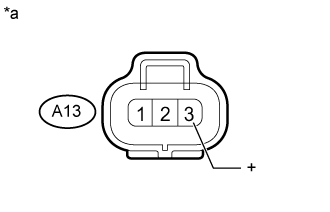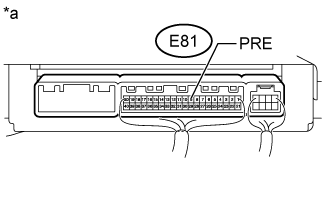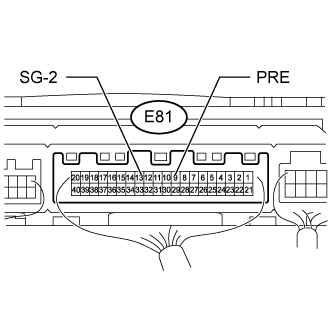DESCRIPTION
WIRING DIAGRAM
INSPECTION PROCEDURE
CHECK HARNESS AND CONNECTOR (POWER SOURCE CIRCUIT)
CHECK HARNESS AND CONNECTOR (GROUND CIRCUIT)
INSPECT AIR CONDITIONER PRESSURE SENSOR (SENSOR SIGNAL CIRCUIT)
INSPECT AIR CONDITIONER PRESSURE SENSOR (SENSOR SIGNAL CIRCUIT)
CHECK HARNESS AND CONNECTOR (AIR CONDITIONER PRESSURE SENSOR - AIR CONDITIONING AMPLIFIER ASSEMBLY)
CHECK HARNESS AND CONNECTOR (AIR CONDITIONER PRESSURE SENSOR - AIR CONDITIONING AMPLIFIER ASSEMBLY)
CHECK HARNESS AND CONNECTOR (AIR CONDITIONER PRESSURE SENSOR - AIR CONDITIONING AMPLIFIER ASSEMBLY)
INSPECT FOR AIR CONDITIONING SYSTEM LEAK
CHARGE REFRIGERANT
RECHECK FOR DTC
CHECK AIR CONDITIONER PRESSURE SENSOR
REPAIR AIR CONDITIONING SYSTEM LEAK
INSPECT CONDENSER FAN
CHARGE REFRIGERANT
RECHECK FOR DTC
REPLACE COOLER EXPANSION VALVE
CHARGE REFRIGERANT
RECHECK FOR DTC
DTC B1423/23 Pressure Sensor Circuit |
DESCRIPTION
This DTC is output when refrigerant pressure is extremely low (-0.4566 MPaG (-4.6 kgf/cm2, -66 psi) or less) or extremely high (3.2943 MPaG (33.6 kgf/cm2, 477 psi) or more). The air conditioner pressure sensor, which is installed on the pipe of the high pressure side to detect refrigerant pressure, outputs the refrigerant pressure signal to the air conditioning amplifier assembly. The air conditioning amplifier assembly converts the signal to pressure according to the sensor characteristics to control the compressor.- HINT:
- Be sure to check the refrigerant volume first when this DTC is output because this DTC can also be output if there is no refrigerant in the cycle.
DTC Code
| DTC Detection Condition
| Trouble Area
|
B1423/23/23
| - An open or short in the air conditioner pressure sensor circuit
- Refrigerant pressure on the high pressure side is extremely low (-0.4566 MPaG (-4.6 kgf/cm2, -66 psi) or less) or extremely high (3.2943 MPaG (33.6 kgf/cm2, 477 psi) or more)
| - Air conditioner pressure sensor
- Harness or connector
- Cooler expansion valve (blocked, stuck)
- Cooler condenser assembly (blocked, deterioration of cooling capacity due to dirt)
- Cooler dryer (moisture in the refrigerant cycle cannot be absorbed)
- Condenser fan (condenser cannot be cooled down)
- Air conditioning system (leaks, blocked)
- Refrigerant pipe line
- Air conditioning amplifier assembly
|
WIRING DIAGRAM
INSPECTION PROCEDURE
| 1.CHECK HARNESS AND CONNECTOR (POWER SOURCE CIRCUIT) |
Disconnect the air conditioner pressure sensor connector.
Measure the voltage according to the value(s) in the table below.
- Standard Voltage:
Tester Connection
| Switch Condition
| Specified Condition
|
A13-3 (+) - Body ground
| Ignition switch ON
| 4.4 to 5.5 V
|
Text in Illustration*a
| Front view of wire harness connector
(to Air Conditioner Pressure Sensor)
|
| 2.CHECK HARNESS AND CONNECTOR (GROUND CIRCUIT) |
Disconnect the air conditioner pressure sensor connector.
Measure the resistance according to the value(s) in the table below.
- Standard Resistance:
Tester Connection
| Condition
| Specified Condition
|
A13-1 (-) - Body ground
| Always
| Below 1 Ω
|
Text in Illustration*a
| Front view of wire harness connector
(to Air Conditioner Pressure Sensor)
|
| 3.INSPECT AIR CONDITIONER PRESSURE SENSOR (SENSOR SIGNAL CIRCUIT) |
Remove the air conditioning amplifier assembly with its connectors still connected (Click here).
Measure the voltage according to the value(s) in the table below.
- Standard Voltage:
Tester Connection
| Switch Condition
| Specified Condition
|
E81-9 (PRE) - Body ground
| - Ignition switch ON
- A/C switch off
| 0.7 to 4.8 V
|
Text in Illustration*a
| Component with harness connected
(Air Conditioning Amplifier Assembly)
|
- HINT:
- If the measured voltage is not within the normal range, there may be a malfunction in the air conditioning amplifier assembly, air conditioner pressure sensor, or wire harness. It is also possible that the amount of refrigerant may not be appropriate.
| 4.INSPECT AIR CONDITIONER PRESSURE SENSOR (SENSOR SIGNAL CIRCUIT) |
Measure the voltage when the following conditions are satisfied.
Item
| Condition
|
Engine Speed
| 1500 rpm
|
Vehicle Doors
| Fully open
|
Temperature Setting
| MAX COLD
|
Blower Speed
| HI
|
A/C Switch
| ON
|
R/F Switch
| RECIRCULATION
|
Interior Temperature
| 25 to 35°C (77 to 95°F)
|
- NOTICE:
- If refrigerant pressure on the high pressure side becomes extremely high during the inspection (if the voltage exceeds 4.8 V), the fail-safe function stops compressor operation. Therefore, measure the voltage before the fail-safe operation.
- It is necessary to measure the voltage for a certain amount of time (approximately 10 minutes) because the problem symptom may recur after a while.
- HINT:
- When the outside air temperature is low (below -1.5°C (29.3°F)), the compressor stops due to operation of the ambient temperature and the evaporator temperature sensor to prevent the evaporator from freezing. In this case, perform the inspection in a warm indoor environment.
Measure the voltage according to the value(s) in the table below.
- Standard Voltage:
Tester Connection
| Switch Condition
| Specified Condition
|
B81-9 (PRE) - Body ground
| - Ignition switch ON
- A/C switch on
| 0.7 to 4.8 V
|
Text in Illustration*a
| Component with harness connected
(Air Conditioning Amplifier Assembly)
|
| OK |
|
|
|
| REPLACE AIR CONDITIONING AMPLIFIER ASSEMBLY (Click here) |
|
| 5.CHECK HARNESS AND CONNECTOR (AIR CONDITIONER PRESSURE SENSOR - AIR CONDITIONING AMPLIFIER ASSEMBLY) |
Disconnect the A13 air conditioner pressure sensor connector.
Disconnect the E81 air conditioning amplifier assembly connector.
Measure the resistance according to the value(s) in the table below.
- Standard Resistance:
Tester Connection
| Condition
| Specified Condition
|
A13-3 (+) - E81-30 (S5-3)
| Always
| Below 1 Ω
|
A13-3 (+) or E81-30 (S5-3) - Body ground
| Always
| 10 kΩ or higher
|
| | REPAIR OR REPLACE HARNESS OR CONNECTOR |
|
|
| OK |
|
|
|
| REPLACE AIR CONDITIONING AMPLIFIER ASSEMBLY (Click here) |
|
| 6.CHECK HARNESS AND CONNECTOR (AIR CONDITIONER PRESSURE SENSOR - AIR CONDITIONING AMPLIFIER ASSEMBLY) |
Disconnect the A13 air conditioner pressure sensor connector.
Disconnect the E81 air conditioning amplifier assembly connector.
Measure the resistance according to the value(s) in the table below.
- Standard Resistance:
Tester Connection
| Condition
| Specified Condition
|
A13-1 (-) - E81-13 (SG-2)
| Always
| Below 1 Ω
|
A13-1 (-) or E81-13 (SG-2)- Body ground
| Always
| 10 kΩ or higher
|
| | REPAIR OR REPLACE HARNESS OR CONNECTOR |
|
|
| OK |
|
|
|
| REPLACE AIR CONDITIONING AMPLIFIER ASSEMBLY (Click here) |
|
| 7.CHECK HARNESS AND CONNECTOR (AIR CONDITIONER PRESSURE SENSOR - AIR CONDITIONING AMPLIFIER ASSEMBLY) |
Disconnect the A13 air conditioner pressure sensor connector.
Disconnect the E81 air conditioning amplifier assembly connector.
Measure the resistance according to the value(s) in the table below.
- Standard Resistance:
Tester Connection
| Condition
| Specified Condition
|
A13-2 (PR) - E81-9 (PRE)
| Always
| Below 1 Ω
|
A13-2 (PR) or E81-9 (PRE) - Body ground
| Always
| 10 kΩ or higher
|
| | REPAIR OR REPLACE HARNESS OR CONNECTOR |
|
|
| 8.INSPECT FOR AIR CONDITIONING SYSTEM LEAK |
Install the manifold gauge set.
Recover the refrigerant from the air conditioning system using a refrigerant recovery unit.
Evacuate the air conditioning system and check that vacuum can be maintained in it.
- OK:
- Vacuum can be maintained in the air conditioning system.
- HINT:
- If vacuum cannot be maintained in the air conditioning system, refrigerant may be leaking from it. In this case, it is necessary to repair or replace the leaking part of the air conditioning system.
Add an appropriate amount of refrigerant (Click here).
Recheck for DTCs when the following conditions are satisfied.
Item
| Condition
|
Engine Speed
| 1500 rpm
|
Vehicle Doors
| Fully open
|
Temperature Setting
| MAX COLD
|
Blower Speed
| HI
|
A/C Switch
| ON
|
R/F Switch
| RECIRCULATION
|
Interior Temperature
| 25 to 35°C (77 to 95°F)
|
- NOTICE:
- If refrigerant pressure on the high pressure side becomes high, the DTC will be stored. Therefore, it is necessary to measure the voltage for a certain amount of time (approximately 10 minutes) because the DTC may be stored after the air conditioning system operates for a while.
- HINT:
- When the outside air temperature is low (below -1.5°C (29.3°F)), the compressor stops due to operation of the ambient temperature sensor and the evaporator temperature sensor to prevent the evaporator from freezing. In this case, perform the inspection in a warm indoor environment.
- OK:
- DTC B1423/23 is not output.
- NOTICE:
- If the DTC was output due to an insufficient or excessive amount of refrigerant, the problem may have been solved after performing the previous step. However, the root cause of insufficient refrigerant may be refrigerant leaks. The root cause of excessive refrigerant may be adding refrigerant when the level was insufficient. Therefore, identify and repair the area where refrigerant leaks as necessary.
| 11.CHECK AIR CONDITIONER PRESSURE SENSOR |
Install the manifold gauge set.
Reconnect the A13 air conditioner pressure sensor connector.
Remove the air conditioning amplifier assembly with its connectors still connected (Click here).
Turn the ignition switch to ON.
Measure the voltage according to the value(s) in the table below.
- Standard Voltage:
Tester Connection
| Condition
| Specified Condition
|
E81-9 (PRE) - E81-13 (SG-2)
| Refrigerant pressure:
Normal pressure (less than 3.0732 MPa [31.4 kgf/cm2, 445 psi] and more than 0.1762 MPa [1.8 kgf/cm2, 25 psi])
| 1.0 to 4.8 V
|
Refrigerant pressure:
Abnormal (less than 0.1762 MPa [1.8 kgf/cm2, 25 psi])
| Below 1 V
|
Refrigerant pressure:
Abnormal (more than 3.0732 MPa [31.4 kgf/cm2, 445 psi])
| 4.8 V or higher
|
Text in Illustration*a
| Component with harness connected
(Air Conditioning Amplifier Assembly)
|
| | REPLACE AIR CONDITIONER PRESSURE SENSOR (Click here) |
|
|
| OK |
|
|
|
| REPLACE AIR CONDITIONING AMPLIFIER ASSEMBLY (Click here) |
|
| 12.REPAIR AIR CONDITIONING SYSTEM LEAK |
Identify the area where refrigerant leaks (Click here).
Repair the identified area of the air conditioning system.
Evacuate the air conditioning system.
- NOTICE:
- For vehicles without an condenser fan, go to "CHARGE REFRIGERANT".
Inspect that the condenser fan operates normally (Click here).
Use a refrigerant recovery unit to recover refrigerant.
Evacuate the air conditioning system.
Add an appropriate amount of refrigerant (Click here).
- HINT:
- If refrigerant is added and the system has not been properly evacuated (insufficient vacuum time), moisture in the air remaining in the system will freeze in the expansion valve, blocking the flow on the high pressure side. Therefore, in order to confirm the problem, recover the refrigerant and properly evacuate the system. Add an appropriate amount of refrigerant, and check for the DTC.
Recheck for DTCs when the following conditions are satisfied.
Item
| Condition
|
Engine Speed
| 1500 rpm
|
Vehicle Doors
| Fully open
|
Temperature Setting
| MAX COLD
|
Blower Speed
| HI
|
A/C Switch
| ON
|
R/F Switch
| RECIRCULATION
|
Interior Temperature
| 25 to 35°C (77 to 95°F)
|
- NOTICE:
- If refrigerant pressure on the high pressure side becomes high, the DTC will be stored. Therefore, it is necessary to measure the voltage for a certain amount of time (approximately 10 minutes) because the DTC may be stored after the air conditioning system operates for a while.
- HINT:
- When the outside air temperature is low (below -1.5°C (29.3°F)), the compressor stops due to operation of the ambient temperature sensor and the evaporator temperature sensor to prevent the evaporator from freezing. In this case, perform the inspection in a warm indoor environment.
- If refrigerant is added and the system has not been properly evacuated (insufficient vacuum time), moisture in the air remaining in the system will freeze in the expansion valve, blocking the flow on the high pressure side. Therefore, in order to confirm the problem, recover the refrigerant and properly evacuate the system. Add an appropriate amount of refrigerant, and check for the DTC. If the DTC is not output after this procedure, it indicates that the cooler dryer in the condenser is not able to absorb moisture in the refrigerant cycle. In this case, to complete the repair it is necessary to replace the cooler dryer.
- OK:
- DTC B1423/23 is not output.
| 16.REPLACE COOLER EXPANSION VALVE |
Replace the cooler expansion valve with a normal one.
- for LHD: Click here
- for RHD: Click here
- HINT:
- Replace the cooler expansion valve with a normal one because the cooler expansion valve is either stuck or clogged.
Add an appropriate amount of refrigerant (Click here).
Recheck for DTCs when the following conditions are satisfied.
Item
| Condition
|
Engine Speed
| 1500 rpm
|
Vehicle Doors
| Fully open
|
Temperature Setting
| MAX COLD
|
Blower Speed
| HI
|
A/C Switch
| ON
|
R/F Switch
| RECIRCULATION
|
Interior Temperature
| 25 to 35°C (77 to 95°F)
|
- NOTICE:
- If refrigerant pressure on the high pressure side becomes high, the DTC will be stored. Therefore, it is necessary to measure the voltage for a certain amount of time (approximately 10 minutes) because the DTC may be stored after the air conditioning system operates for a while.
- HINT:
- When the outside air temperature is low (below -1.5°C (29.3°F)), the compressor stops due to operation of the ambient temperature sensor and the evaporator temperature sensor to prevent the evaporator from freezing. In this case, perform the inspection in a warm indoor environment.
- If refrigerant pressure is not normal after replacing the expansion valve with a normal one, the condenser or pipes may be clogged due to dirt, dust or other contaminants. In this case, clean or replace the condenser or pipes.
- OK:
- DTC B1423/23 is not output.





